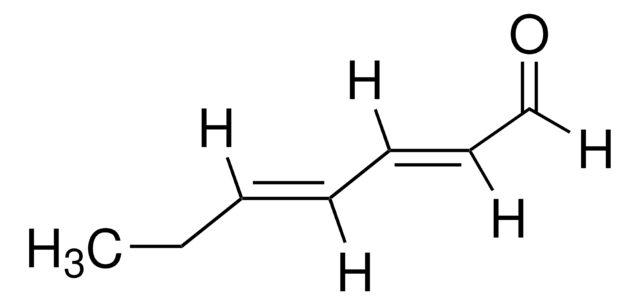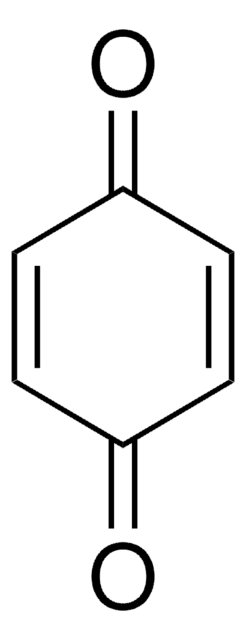W316407
trans,trans-2,4-Heptandienal
≥88%
Synonym(s):
2,4-Heptadienal
About This Item
Kosher
Recommended Products
biological source
synthetic
Quality Level
grade
Halal
Kosher
Assay
≥88%
refractive index
n20/D 1.534 (lit.)
bp
84-84.5 °C (lit.)
density
0.881 g/mL at 25 °C (lit.)
application(s)
flavors and fragrances
Documentation
see Safety & Documentation for available documents
food allergen
no known allergens
Organoleptic
fatty; green; oily; vegetable
SMILES string
CC\C=C\C=C\C=O
InChI
1S/C7H10O/c1-2-3-4-5-6-7-8/h3-7H,2H2,1H3/b4-3+,6-5+
InChI key
SATICYYAWWYRAM-VNKDHWASSA-N
Looking for similar products? Visit Product Comparison Guide
Disclaimer
Signal Word
Danger
Hazard Statements
Precautionary Statements
Hazard Classifications
Acute Tox. 3 Dermal - Acute Tox. 4 Oral - Skin Irrit. 2
Storage Class Code
6.1C - Combustible acute toxic Cat.3 / toxic compounds or compounds which causing chronic effects
WGK
WGK 3
Flash Point(F)
143.6 °F - closed cup
Flash Point(C)
62 °C - closed cup
Personal Protective Equipment
Regulatory Listings
Regulatory Listings are mainly provided for chemical products. Only limited information can be provided here for non-chemical products. No entry means none of the components are listed. It is the user’s obligation to ensure the safe and legal use of the product.
FSL
Group 4: Flammable liquids
Type 2 petroleums
Hazardous rank III
Water insoluble liquid
JAN Code
W316407-1KG-K:
W316407-250G-K:
W316407-BULK-K:
W316407-SAMPLE-K:
W316407-100G:
W316407-VAR-K:
W316407-BULK:
W316407-1KG:
W316407-250G:
W316407-100G-K:
W316407-SAMPLE:
Choose from one of the most recent versions:
Already Own This Product?
Find documentation for the products that you have recently purchased in the Document Library.
Our team of scientists has experience in all areas of research including Life Science, Material Science, Chemical Synthesis, Chromatography, Analytical and many others.
Contact Technical Service





